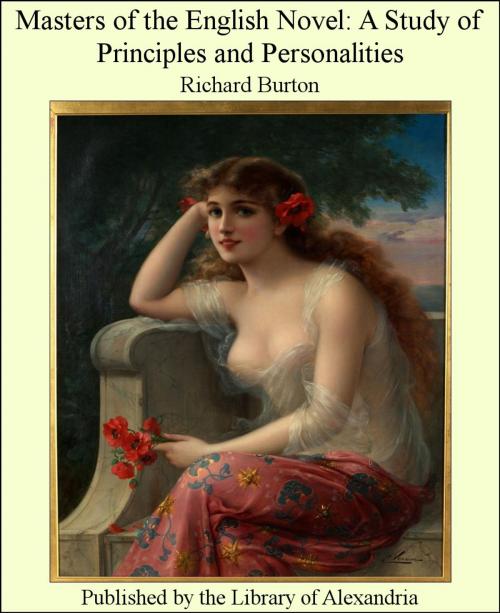Masters of the English Novel: A Study of Principles and Personalities
Nonfiction, Religion & Spirituality, New Age, History, Fiction & Literature| Author: | Richard Burton | ISBN: | 9781465525789 |
| Publisher: | Library of Alexandria | Publication: | March 8, 2015 |
| Imprint: | Language: | English |
| Author: | Richard Burton |
| ISBN: | 9781465525789 |
| Publisher: | Library of Alexandria |
| Publication: | March 8, 2015 |
| Imprint: | |
| Language: | English |
The principle of inclusion in this book is the traditional one which assumes that criticism is only safe when it deals with authors who are dead. In proportion as we approach the living or, worse, speak of those still on earth, the proper perspective is lost and the dangers of contemporary judgment incurred. The light-minded might add, that the dead cannot strike back; to pass judgment upon them is not only more critical but safer. Sometimes, however, the distinction between the living and the dead is an invidious one. Three authors hereinafter studied are examples: Meredith, Hardy and Stevenson. Hardy alone is now in the land of the living, Meredith having but just passed away. Yet to omit the former, while including the Other two, is obviously arbitrary, since his work in fiction is as truly done as if he, like them, rested from his literary labors and the gravestone chronicled his day of death. For reasons best known to himself, Mr. Hardy seems to have chosen verse for the final expression of his personality. It is more than a decade since he published a novel. So far as age goes, he is the senior of Stevenson: "Desperate Remedies" appeared when the latter was a stripling at the University of Edinburgh. Hardy is therefore included in the survey. I am fully aware that to strive to measure the accomplishment of those practically contemporary, whether it be Meredith and Hardy or James and Howells, is but more or less intelligent guess-work. Nevertheless, it is pleasant employ, the more interesting, perhaps, to the critic and his readers because an element of uncertainty creeps into what is said. If the critic runs the risk of Je suis, J'y reste, he gets his reward in the thrill of prophecy; and should he turn out a false prophet, he is consoled by the reflection that it will place him in a large and enjoyable company. Throughout the discussion it has been the intention to keep steadily before the reader the two main ways of looking at life in fiction, which have led to the so-called realistic and romantic movements. No fear of repetition in the study of the respective novelists has kept me from illustrating from many points of view and taking advantage of the opportunity offered by each author, the distinction thus set up. For back of all stale jugglery of terms, lies a very real and permanent difference. The words denote different types of mind as well as of art: and express also a changed interpretation of the world of men, resulting from the social and intellectual revolution since 1750
The principle of inclusion in this book is the traditional one which assumes that criticism is only safe when it deals with authors who are dead. In proportion as we approach the living or, worse, speak of those still on earth, the proper perspective is lost and the dangers of contemporary judgment incurred. The light-minded might add, that the dead cannot strike back; to pass judgment upon them is not only more critical but safer. Sometimes, however, the distinction between the living and the dead is an invidious one. Three authors hereinafter studied are examples: Meredith, Hardy and Stevenson. Hardy alone is now in the land of the living, Meredith having but just passed away. Yet to omit the former, while including the Other two, is obviously arbitrary, since his work in fiction is as truly done as if he, like them, rested from his literary labors and the gravestone chronicled his day of death. For reasons best known to himself, Mr. Hardy seems to have chosen verse for the final expression of his personality. It is more than a decade since he published a novel. So far as age goes, he is the senior of Stevenson: "Desperate Remedies" appeared when the latter was a stripling at the University of Edinburgh. Hardy is therefore included in the survey. I am fully aware that to strive to measure the accomplishment of those practically contemporary, whether it be Meredith and Hardy or James and Howells, is but more or less intelligent guess-work. Nevertheless, it is pleasant employ, the more interesting, perhaps, to the critic and his readers because an element of uncertainty creeps into what is said. If the critic runs the risk of Je suis, J'y reste, he gets his reward in the thrill of prophecy; and should he turn out a false prophet, he is consoled by the reflection that it will place him in a large and enjoyable company. Throughout the discussion it has been the intention to keep steadily before the reader the two main ways of looking at life in fiction, which have led to the so-called realistic and romantic movements. No fear of repetition in the study of the respective novelists has kept me from illustrating from many points of view and taking advantage of the opportunity offered by each author, the distinction thus set up. For back of all stale jugglery of terms, lies a very real and permanent difference. The words denote different types of mind as well as of art: and express also a changed interpretation of the world of men, resulting from the social and intellectual revolution since 1750















